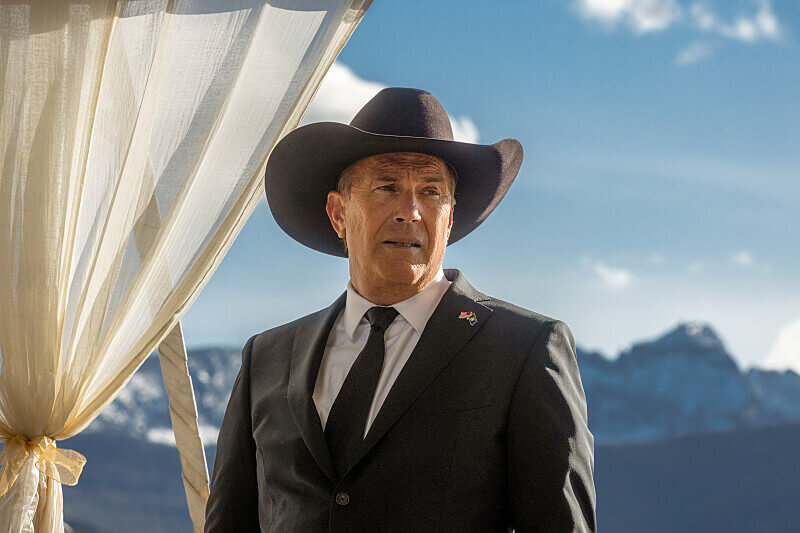John Papsidera on Establishing ‘Yellowstone’s Dutton Family and Casting Christopher Nolan’s ‘Oppenheimer’
When John Papsidera was hired to be the casting director for Yellowstone, he had no idea he’d eventually be a key player in helping to populate a western universe, which would come to include the spinoffs 1883 and 1923.
The two-time Emmy winner spoke to Casting Networks about establishing the popular television franchise featuring the Dutton family, and how it expanded to additional shows over the past few years. He also discussed his two-decade-plus collaboration with Christopher Nolan, which includes casting the filmmaker’s upcoming July release, Oppenheimer.
At what point were you brought into the project?
John Linson, the producer who created Yellowstone with Taylor Sheridan, is who I met with. I had not met with Taylor until I was already hired, which seems ridiculous to think now. But it was a different landscape then. Taylor was not “Taylor” in a lot of ways.
Kevin Costner was already involved. Having been an acting coach and an actor, Taylor already knew many people and had his own ideas about who he was interested in. He knew of Luke Grimes (Kayce Dutton). He knew of Wes Bentley (Jamie Dutton). Cole Hauser (Rip Wheeler) was a friend of his. He was friends with Ryan Bingham (Walker). There were a lot of people that Taylor had in mind. He liked Gil Birmingham (Thomas Rainwater). This was all early on. It was certainly a big cast to wrangle initially, but that’s where things began to unfold.
With such a large cast, it seems like it could be an overwhelming task.
You start with the big pieces – the tentpole characters – and then build around them. The biggest part was solidifying the guys. I remember Taylor saying, what do you think of Luke Grimes? I worked on a remake of Dirty Dancing, and Luke was the choice. Ultimately that movie didn’t get made, but I had known Luke for many years, and I thought he was fantastic. Beth Dutton (played by Kelly Reilly) was also a big piece we dove into initially.
Filling those roles – do you go through your rolodex of people, or do open calls begin immediately?
Normally I would read the script, come up with ideas and thoughts about those characters, then sit with the creative team and pitch them those ideas. They’ll either think those ideas are great, or they’ve already thought of them, or hadn’t ever thought of them. That’s the basis of the beginnings of those lists. It’s culminated and collected regarding who’s an offer and who will read. We work on a breakdown, and then it goes out. We start reading, start taping people and the process unfolds.
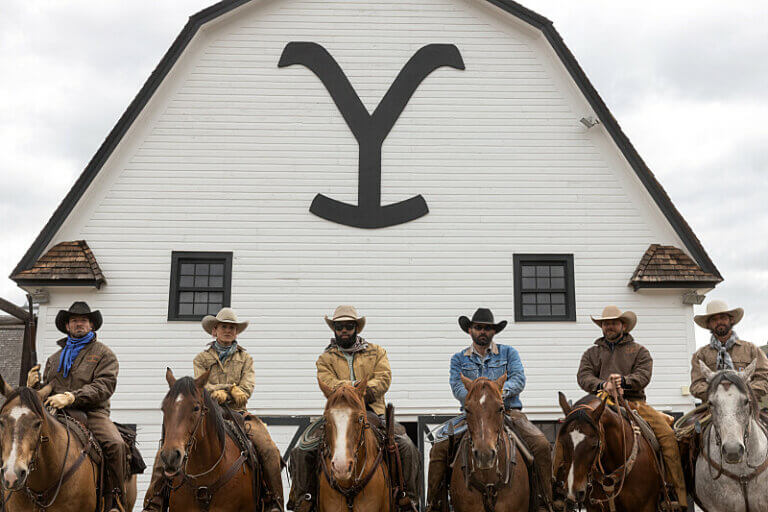 Photo courtesy of Paramount Network.
Photo courtesy of Paramount Network.When you’re casting a family, do you try to match up looks so they physically resemble a family, or is it more about finding an essence?
I love to find the linkage and the genetics of people: their looks – eyes, noses and all that kind of specificity. Taylor’s not very driven by that. He’s more driven by who he wants to work with, who he responds to and who he likes as an actor.
Who are some actors you’re proud to have brought into Yellowstone?
Kelly Reilly. Taylor didn’t know Kelly. I first became aware of her when I saw her in 2008’s Eden Lake. At that time, I was casting one of [Christopher Nolan’s] Batman movies, and we were thinking about Michael Fassbender, so I watched Eden Lake because he was in it. Kelly starred opposite him; since then, I’ve been a big fan. I like her a lot, so I brought her to Taylor’s attention.
Kelly was one of the first serious contenders for the women we were looking at for Beth. She was one of the first ones to go on tape. She got the character. It took the other (female contenders) longer to get there. She just grabbed it.
Jefferson White, who plays Jimmy, is another one I’m proud of. He was one of the first guys I thought of and wanted to put on tape. In the beginning, Taylor was like, “No, I don’t think he’s it,” and I was like, “I’m telling you, Jefferson’s it.” Eventually, we got there. Jefferson is amazing in the role. I was also thrilled to get to cast Will Patton. I’ve been a Will Patton fan for years.
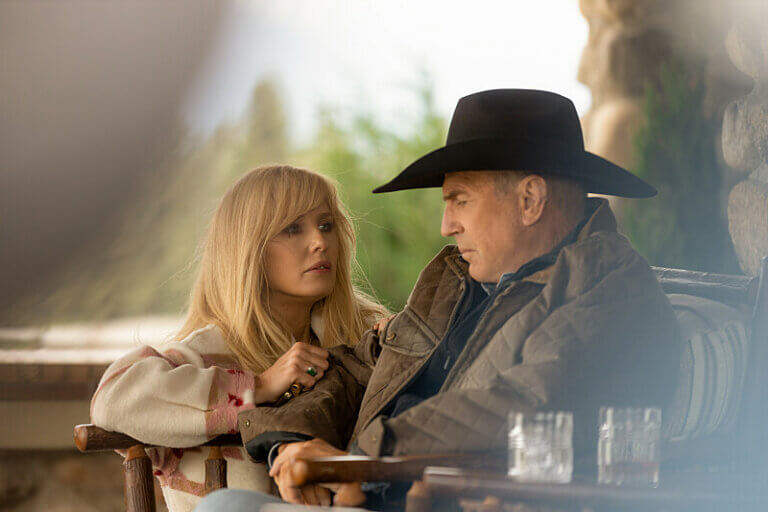 Photo courtesy of Paramount Network.
Photo courtesy of Paramount Network.You went on to cast the subsequent spinoffs as well, including 1883 and 1923. Did you know there would be others when you first started casting Yellowstone?
No. It wasn’t even in the cards at that time at all.
Were you able to indulge in creating genetic linkage when casting those characters in the spinoffs, knowing all these generations of Duttons are related in the bigger picture?
As I said, it doesn’t matter much to Taylor. When it came to 1883, he had already spoken to Tim McGraw and Faith Hill. All that just fell into place as we started going down the path of casting the relatives. But for me, I love doing that. When I cast shows like Paramount [Networks’] The Offer (about the making of The Godfather film), it was about how close can you get to the original characters and how can you reinterpret them. I’m a sucker for that. I did the Dumb and Dumber sequel in 2003 and the 2011 television version of Charlie’s Angels. I find it interesting to riff off an original piece and try to capture something new and fresh about it, yet honor what came before it. I like those challenges. I’m sure other people steer clear of them because it adds another layer of difficulty in casting.
In your early days of casting, you were a casting associate on the 1994 film Clear and Present Danger, starring Harrison Ford. Cut to today, where you’re casting yet another Yellowstone spinoff, 1923, with Harrison Ford as the Dutton patriarch. That must feel like coming full circle, in a way.
There is something uniquely special about being in the film and television industry. People that I would never have thought I would have any relationship to or idols of mine – suddenly, you get to cast them. It’s one of the things that I love about being a casting director. From the day I meet an actor to the day I drop dead, I don’t ever have to change my opinion about being a fan of an actor’s work. I love being an admirer of their work and what they create. Sometimes, the gods shine upon you, and you get to cast them! With Harrison, he’s so iconic, such a brilliant actor and such a presence in the film industry. To have any relationship with him in years past and then present is special to me.
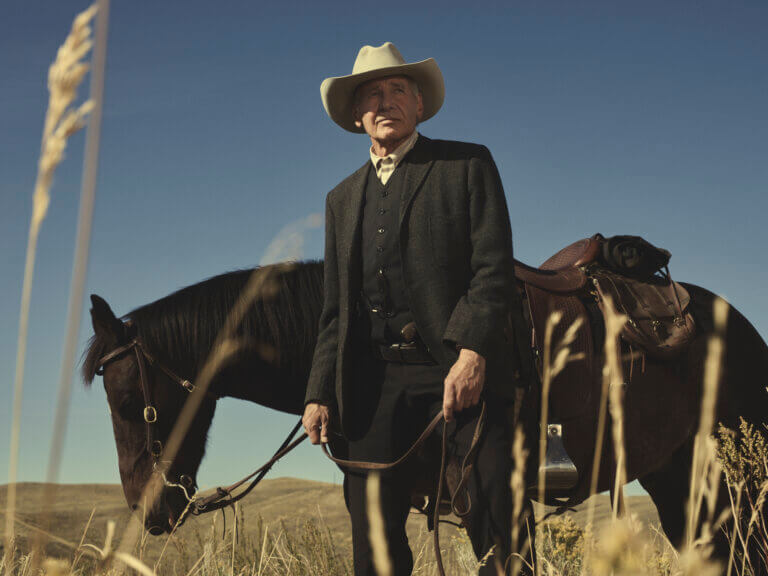 Harrison Ford as Jacob Dutton in 1923 streaming on Paramount+ 2022. Photo Credit: James Minchin III/Paramount Network.
Harrison Ford as Jacob Dutton in 1923 streaming on Paramount+ 2022. Photo Credit: James Minchin III/Paramount Network.You have longstanding relationships with many filmmakers, including Christopher Nolan, Jason Reitman (Ghostbusters: Afterlife, The Front Runner) and James Gunn (The Suicide Squad, Peacemaker). Next month you have Nolan’s Oppenheimer coming out in theaters. Is there a shorthand when you’ve worked with someone for that many years? Are you reading each other’s minds when it comes to casting? Do you discover talent and call him up excitedly and tell him there is someone he should meet?
It’s interesting, Chris does not do generals. So I don’t have that burden to say, “Hey, you should meet this person.” But you do get to know the director’s taste. You do develop trust. It’s a valuable currency. You have a bigger piece of that collaboration than somebody who hires you but doesn’t know you and hasn’t built that shorthand or trust.
How did your relationship with Nolan begin?
I cast the original Austin Powers film, where I worked with producers Suzanne and Jennifer Todd. They called me when they got Memento and said, “There’s this director, he hasn’t really done anything, one little movie in London, would you read the script, and would you be interested?” I read the script three times until I kind of understood it. Then I met Chris, and we’ve done everything, other than Insomnia, since. For me, loyalty and a relationship with creators are the most special things. I’m proud of the fact that I work with the same producers and directors over and over again.
You worked with Chris on small indies and massive projects that changed the landscape of pop culture moviemaking, like the Batman series. Tell me what casting Oppenheimer was like.
It was a different way to work with Chris. We’ve never stacked a film with that many known actors and famous people. That was a different process.
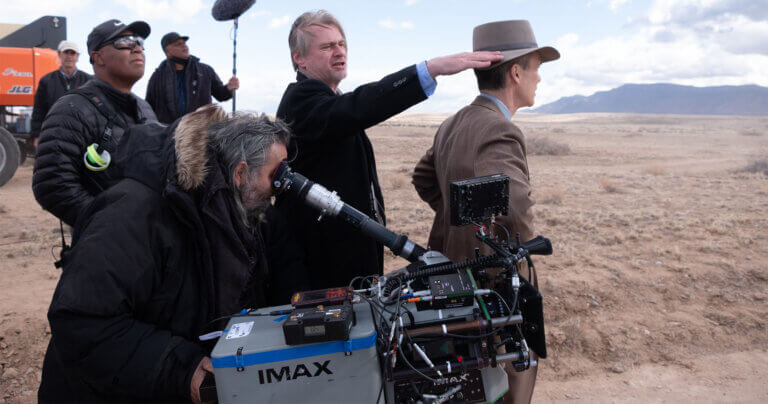 Photo courtesy of Universal Pictures.
Photo courtesy of Universal Pictures.How so?
Chris’ feeling was to be able to compete with the Marvel films of the world. Today’s films are turning more into spectacles. He’s making a movie about a man that developed the atomic bomb. Not exactly superheroes. But Chris had a feeling and an instinct to drive people to this movie with a star-studded cast. We usually don’t think like that for his films. Chris’ films typically have two or three, or five main characters at the most. And yes, you end up with well-known actors in them because he’s a brilliant director and actors want to work with him. Star power is not the driving force in Chris’ films. With Oppenheimer, it was more about utilizing actors’ fame to make the movie feel bigger.
How was that experience?
The difficulty was dealing with actors who usually star in films. Now you’re trying to cast them for less money and juggling the billing. They’re not used to being part of an ensemble or being 15th or 16th on the call list. The deal-making was incredibly challenging. I’d have agents and managers constantly going, “This is insane. He doesn’t get a shared card with four other people.” It was those kinds of mechanics that made it very different.
Let’s talk about actors. When reading them, what environment do you foster in your audition room?
I love actors. It’s part of my job to create space where actors can share a bit of their soul because that’s what the job is to me. I go to the nth degree, or I try within my means to create a creatively stimulating space.
I tell my staff constantly that we’re here to create an acceptable, warm, safe place for actors and directors to create in. I give a lot of detail to my spaces. I’m an art collector, and that’s always part of my spaces. I make them look nice, so no one sits in a fluorescently lit room or dingy little hall office.
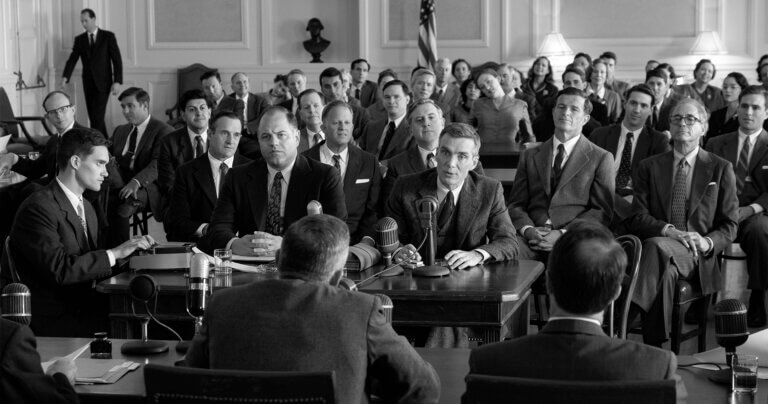 Photo courtesy of Universal Pictures.
Photo courtesy of Universal Pictures.Are you usually in the room during auditions?
Ninety percent of the time, I read with all the actors myself and will direct them. I don’t have a lot of rules. That drives me insane. I sometimes hear of other casting directors having a list of dos and don’ts. Artists are not like that. They’re not machines. It’s not a multiple-choice question. It’s artistry. I create a space that welcomes and encourages that in actors.
I’m sure that means a lot to performers.
I hope so. That’s part of my job. I have heard too many stories where people reading with the actors are rote in reading lines off the page. If you don’t love the process, do something else! I’m here to give everything I can to an actor to help them succeed. I care. I was trained as an actor. I care about reading with actors. I care about giving them as much as possible in an audition to try and get the best results. That’s the job to me.
When an actor comes to you “prepared,” what does that look like for you?
It takes on a lot of different forms. Familiarity with the lines so you can look up off the page is the minimum of being prepared. When a director says, “Do it again but show me something different,” I’m always shocked at how often an actor doesn’t have a distinctly different choice. Most of the time, they do a version of what they did the first time. It would be a great chip for actors if they knew where they could go with a character. It’s not about showing off; it’s being prepared in case you get that question asked – and you may not get it asked. But to have something you can shift into an entirely different gear, make a different choice that changes the scene, that’s all gravy. It lets me know this person has given some thought and is prepared to share whatever they can.
Looking to get your big break? Sign up or login to Casting Networks and land your next acting role today!
You may also like:
- Path to the Emmy Awards: Harold Perrineau Talks His Journey to ‘From’
- Now Casting: Netflix Film, Wild Willies, Arbella and More
- Protecting Yourself From Money Scams
